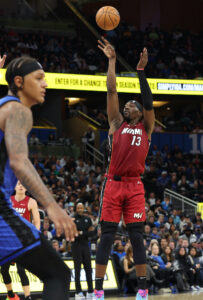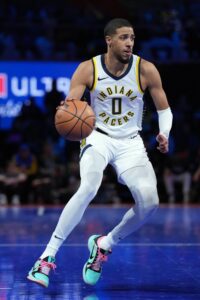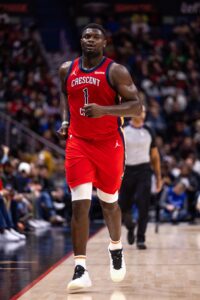The Pelicans didn’t make a move at Thursday’s trade deadline, but it wasn’t for lack of trying, according to head of basketball operations David Griffin, who told reporters that the team had been “in what felt like ‘deal’ mode for a long time,” per Christian Clark of NOLA.com. Ultimately though, there was nothing out there that the front office thought made sense for the club.
“One of the things we find — and this goes back to times in Phoenix and Cleveland — you always try to talk about improving on the margins,” Griffin said. “You have to be really good to be better than the players we have on the margins; to be better than the guys we play rotational minutes. There just wasn’t the right opportunity for us to go after.”
The Pelicans were the subject of an intriguing trade rumor during the final 24 hours before the deadline, when they were linked to Hawks guard Dejounte Murray, but Sam Amick of The Athletic hears from a team source that those talks never got serious. According to Amick, the Pelicans felt they were being used as leverage for the Hawks in their talks with the Lakers.
Asked about New Orleans’ reported discussions with the Hawks, Griffin didn’t deny that they took place and said his team was trying to be “opportunistic,” according to Clark.
“A player of a caliber that you mentioned and the team you mentioned, you listen to those types of things,” Griffin said. “You try to get as much information as you can. At the same time, you don’t have to force a square peg into a round hole when you’re in the situation we are in. I think we wanted to listen and be willing to strike if it was the right opportunity. And we were mindful of the fact that we like our group if it wasn’t.
“… I think we decided overall, the cost was much too high. We weren’t a team that felt like we had to do anything.”
Here’s more out of New Orleans:
- In his comments to the media on Friday, Griffin praised veterans CJ McCollum and Jonas Valanciunas for the sacrifices they’ve made for the sake of the team. “I think CJ McCollum should get a hell of a lot more credit. He’s completely changed his shot profile,” Griffin said, per Clark. “… (And) Jonas has embraced this entire season in a way you almost never see from a veteran starting center who doesn’t have a contract for next year. He understands what he needs to do, and he’s joyful doing it here. He’s willing to make whatever sacrifice he needs to do. … He’s having an incredible defensive year.”
- Asked about what kind of center would be an ideal fit next to Zion Williamson, Griffin said the Pelicans think more about which players would best complement their big three of Williamson, Brandon Ingram, and McCollum. Griffin went on to say that New Orleans would ideally have more shooting and rim protection but that it’s not easy to find well-rounded players who can provide one or both of those traits.
- Here’s more from Griffin, via Clark, on the Pelicans’ ideal center: “I think what goes along with the three of them is sort of TBD to some degree. They are going to have to be pretty good to be better than Jonas. People say, ‘They need this kind of center.’ Well, that kind of center might not be a radically better basketball player or even as good of a basketball player. I think we sometimes lose sight of how incredibly good (Valanciunas) is because we spend so much time as a fan base talking about what he’s not. The ideal fit around those three guys is what advances us to win playoff games. We don’t know we don’t have that right now.”
- The Pelicans don’t control a second-round pick until 2030 and could have replenished their second-round assets to some extent by trading Naji Marshall on Thursday, according to Clark, who hears from sources that the wing drew interest from multiple teams. However, New Orleans opted to hang onto Marshall, who is on track to become an unrestricted free agent this offseason.
- Will Guillory of The Athletic takes a look at the recent reemergence of “Point Zion” and examines what it means for the Pelicans if Williamson continues to embrace his adjusted role, which involves much of the club’s half-court offense running through him. The former No. 1 overall pick has handed out 10 or more assists in a game twice since January 23 after never recording more than nine assists in any of his first 149 NBA contests.
- Within a wide-ranging conversation with Mark Medina of Sportskeeda, Ingram said he doesn’t “plan on missing” any more All-Star games and joked that the coaches who didn’t vote for him as an All-Star reserve constantly double-team him when they face the Pelicans.
 Heat big man
Heat big man  Haliburton is a legitimate All-NBA candidate and would be in line for a
Haliburton is a legitimate All-NBA candidate and would be in line for a  According to Vorkunov, a clause in the contract makes Williamson’s salaries for 2025/26, 2026/27, and 2027/28 non-guaranteed because he missed more than 22 games last season. A year after sitting out an entire season with a foot injury, Williamson managed to play in just 29 games in 2022/23, mainly due to a lingering hamstring issue.
According to Vorkunov, a clause in the contract makes Williamson’s salaries for 2025/26, 2026/27, and 2027/28 non-guaranteed because he missed more than 22 games last season. A year after sitting out an entire season with a foot injury, Williamson managed to play in just 29 games in 2022/23, mainly due to a lingering hamstring issue.